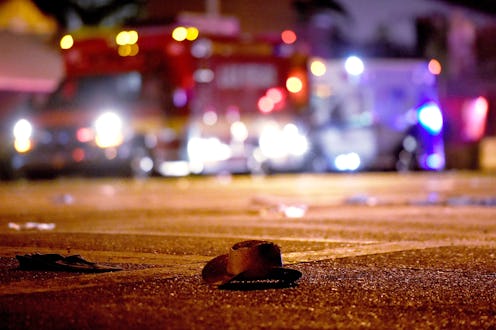News
Why You Shouldn't Call The Las Vegas Suspect A "Lone Wolf"

On Monday morning, hours after the deadliest mass shooting in modern U.S. history, county sheriff Joe Lombardo told assembled reporters:
Right now, we believe it's a solo act, a lone wolf attacker.
The tropes of the "lone wolf" and "mentally disturbed" individual are often used to describe white American men who are the perpetrators of crimes; meanwhile, "terrorist" is often used to describe non-white perpetrators, no matter the crime. The president has not held back from describing attacks in Western regions by Muslim perpetrators as "terrorism" on Twitter, and yet he did not use the term about the Las Vegas suspect when he weighed in on the tragedy Monday morning.
The trope that a white suspect is a "mentally disturbed" individual, a "lone wolf" who by definition could not pose as much a threat as a "terrorist," has dictated the conversation around mass shootings for years. Whether it's the Charleston shooter, the Isla Visa shooter, the Sandy Hook shooter, or the man who shot up a Planned Parenthood, the phrase "lone wolf" has cropped up in media coverage, in authorities' press conferences, and in national dialogue about gun control. It's a placeholder for "white," or, in other words, an individual whose crime is somehow less threatening to national peace than that of a "terrorist's."
Just hours after the shooting in Las Vegas, authorities ruled out terrorism as a possible motive, according to The Independent. Following this announcement, gun control advocates once again took note of the careless tropes that surround conversations about mass shootings.
Yet, terrorism is defined simply as "the systematic use of terror, especially as a means of coercion" by Merriam-Webster. In addition, Nevada's state definition of "terrorism" leaves out any mention of political motive, so a perpetrator doesn't need to have an overarching motive to be considered a terrorist in that state. It's crucial to note that even before authorities were able to confirm a death toll, they were able to publicly define the event as not being a terrorist act.
To call the perpetrator of the Las Vegas shooting a "lone wolf" is to dilute the impact of his actions — which, it should be noted, would be the deadliest act of domestic terror since 9/11, if considered as such — and to give others a sense of false security. By definition, if a "lone wolf" has committed the crime he set out to do and is deceased, then other people must therefore be safe. Unlike crimes committed by terror cells, for example, the line of thought is that the act of violence must begin and ends with the "lone wolf."
It's a comforting line of thought, but an inaccurate one. Moreover, it plays into the idea that "thoughts and prayers" for the victims and their families is somehow enough, and that meaningful gun reform isn't a crucial tool to prevent this kind of tragedy from happening again. When we use the term "lone wolf," we subconsciously convince ourselves that this was a one-off, and that we're safe — and that, given the frightening statistics for gun violence in the United States, makes us less safe than ever.